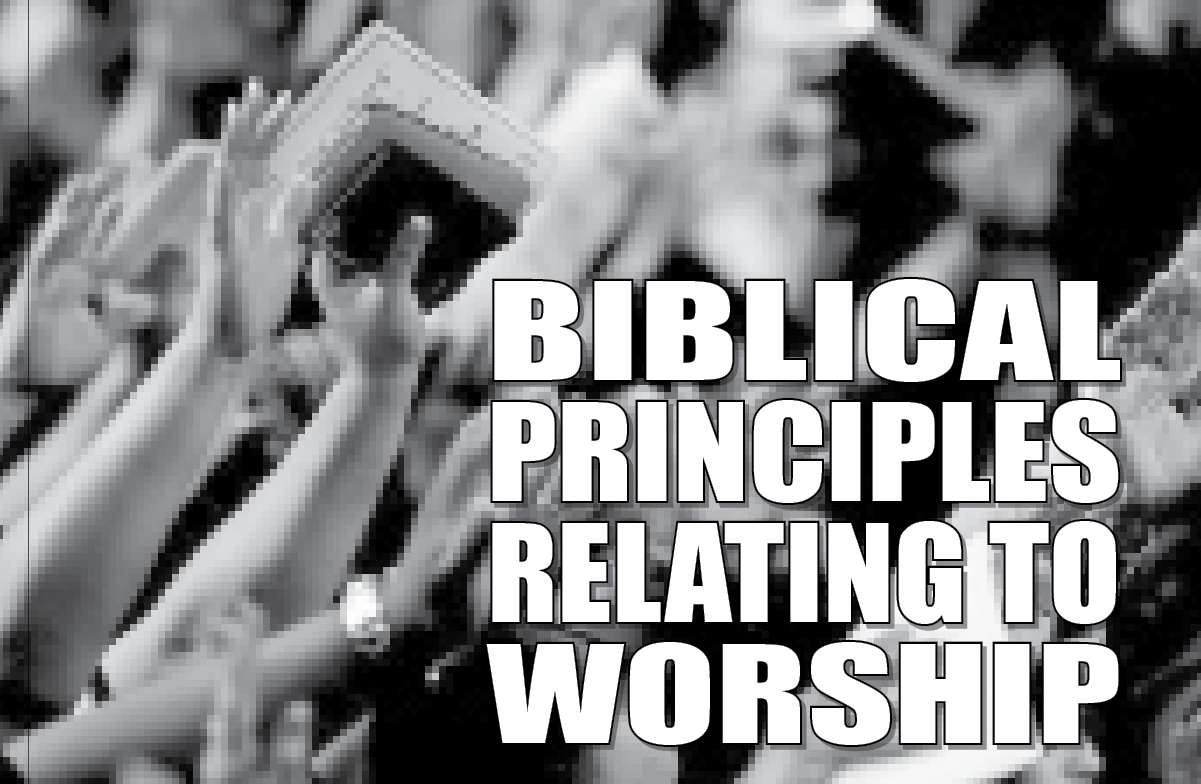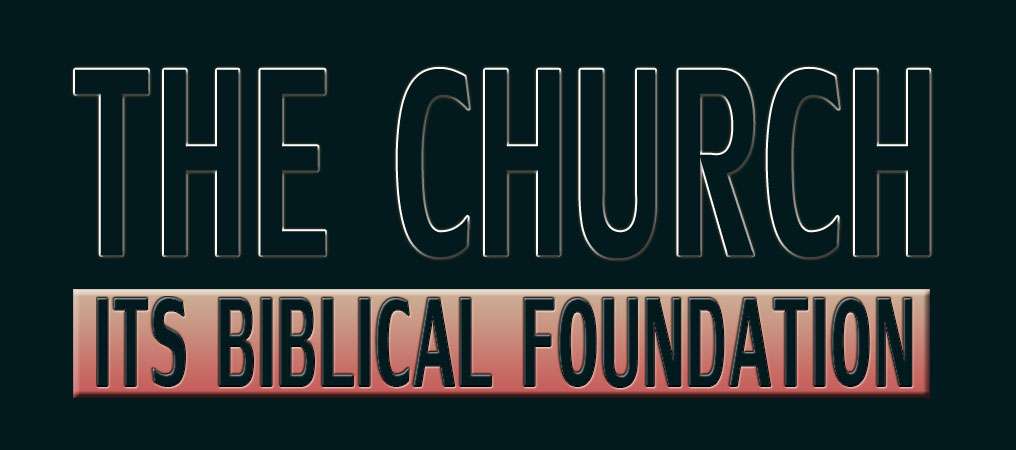

Biblical Principles Relating to Worship
Dr. A. C. George
Worship which is acceptable to God must be performed according to God’s Word. Any act of worship which is not in accordance with biblical principles is a mockery and mere ritualism. Let us examine the basic principles that govern true worship.
A. Only God is Worthy of Worship
The Scriptures state categorically that there is only one true God and that worship must be offered to H im alone (Ex.20:3). The first three of the Ten Commandments were directed against the crass polytheism which characterized the religions of the ancient Near East. The Israelites were strictly prohibited from making or worshipping other gods, which from the biblical perspective were no gods at all (ex.20:3,4). They were also warned not to make any images or representations of the true God (Deut.4:19,23-28). On the other hand, they were commanded to fear the Lord and serve only Him (cf.Deut.32:39; Josh.24:14-15). Idolatry was punishable by death (cf. Ex.32:27-35).
A careful study of the Scriptures – both Old and New Testaments – shows that worship is the exclusive right of God. The Word of God strongly prohibits and condemns any attempt on the part of man to attribute power and glory to any human being or spirit or images that are represented as deities. Worship must be directed to God alone. Since God is invisible and transcendent, any representations of God through images or pictures would be dishonoring to Him and would detract from His true nature as revealed in the Word of God. All forms of idolatry – physical and spiritual – are to be shunned (1 John 5:21). God alone must be loved and worshipped. He says: “I am the first and the last; apart from me there is no God” (Isa. 44:6).
B. Worship Transcends the Limitations of Time and Space
God being eternal and infinite, cannot be limited by time or space. Even after the time line of history comes to an end, the Lord will be worshipped. The Revelator gives us a graphic picture of the worship rendered to the Lamb by the angelic hosts and all the redeemed saints. The scene is very much like the one the prophet Isaiah saw in his vision (Isa.6:1-4). The four living creatures that remind us of the Seraphs in Isaiah ascribe glory and honour to the one who sits upon the throne saying:
“Holy, holy, holy
is the Lord God Almighty,who was,
and is, and is to come.” (Rev.4:8)
This act of worship gains momentum when the twenty-four elders fall down and worship the King of glory at whose feet they lay their crowns. They shout in unison:
“You are worthy, our Lord and God,
to receive glory and honour and power,
for you created all things,
and by your will they were created
and have their being.” (Rev.4:11)
Undoubtedly, worship will be the salient feature of eternity! As such, the worship of God here on earth is just a preparation and training for that great event.
The worship of God – whom the heavens and the earth cannot contain, as King Solomon rightly acknowledges at the dedication of the temple (1 Kings 8:27) – cannot be localized. It is true that in the Old Testament we read of certain selected places, like the tabernacle and the temple that Solomon built, where God chose to manifest His presence through the glory–cloud called “Shekinah.” It has to be pointed out also that Jerusalem gained significance because of the temple where the Israelites gathered to worship God and celebrate their festivals (1 Kings 8:15-53). Worship in the New Testament is not confined to any particular place, as was made clear by the Lord Himself: “neither on this mountain nor in Jerusalem” (John 4:21). What matters in New Testament worship is not the place of worship, but the manner of worship – “in spirit and truth” (John 4:24). It is to be noted that neither the Lord Jesus nor His apostles left any instructions to their followers to build sanctuaries for worship. The Apostolic Church had no problem worshipping God in houses or temple or prison or any convenient place where they could come together to glorify the Saviour (Acts 2:46-47; 16:25). The New Testament emphasis is not on the place of worship, but on the people who constitute the Church, which is called “the pillar and foundation of the truth” (1 Tim.3:15), and “a holy temple” (Eph.2:22).
C. Worship provides the Dynamism for Victorious Christian Living
One of the fallacies relating to worship is that worship is something that takes place periodically and only in certain contexts. Many “worship leaders” seem to think that actual worship of God takes place only at certain parts of the service when the congregation raise their voices and utter words of praise. It can be observed that some worship leaders do not think that the hymns and choruses that are sung in the church are an essential part of worship. At the same time, the Sunday morning service is often referred to as the “worship service.” It is very important for Christians to realize that our whole life is and ought to be an act of worship. Worship is a human response to the divine grace shown to us. It streams from the heart and flows through every fibre of a believer’s being and then overflows through all the channels of his life and activities to others who come into contact with him.
When worship is understood in its larger and deeper dimensions, it becomes a meaningful and enriching experience. A true worshipper whose encounter with God is genuine cannot but radiate the grace, love and power of God. Worship will liberate one’s spirit from all shackles. It will provide happiness and contentment. The Psalmist describes the worshippers this way: “Happy are those who have reverence for the Lord” (Ps.128:1). Worship will recharge the spiritual batteries of the believers so that they can run the race well and be victorious. It is about such worshippers that the Psalmist sang: “They go from strength to strength till each appears before God in Zion” (Ps.84:7).
D. Worship involves the Whole Life and Activities of a Child of God
Worship is not to be perceived as something that an individual does periodically, or that it covers a few spiritual exercises such as prayer and praise. True worship covers the whole gamut of human activities and experiences. Worship can be rendered to God in the context of a congregational act of worship as well as in the solitude of an individual whose heart rises toward the Lord of Heaven. Worship occurs when feelings and thoughts are verbalized through prayers. Worship can also occur when the human intelligence fails to translate the yearnings of the human heart into audible utterances. St. Paul speaks of this mediation of the Spirit this way:
In the same way, the Spirit helps us in our weakness.
We do not know what we ought to
pray for,
but the Spirit himself intercedes for us with groans that
words cannot express. (Rom.8:26)
Commenting on the Spirit’s intercession for the believer, Dr. Stanley Horton says:
“In our weakness we often do not understand ourselves or our needs. We want to do God’s will, but we do not even know how to pray as we should. Then the Spirit comes to our aid and makes intercession for us (instead of us) with groanings too deep for words.”
It is important for us to learn that worship can be done without speaking aloud. It is not only possible but necessary for God’s people to worship God through silent prayer. This may not be palatable to those who tend to equate spirituality with the volume of sound they can produce in worship services. It gives them an opportunity to be heard and to hear. But there are times when God’s people will have to learn the truth of God’s Word: “Be still, and know that I am God…” (Ps.46:10). Hearing is possible only when one learns to wait patiently and silently before God and allow God to speak to him (cf. Ps.40:1). Many a Christian does not hear God speaking to him simply because he does not give God the opportunity to speak. Judy Bartel has this to say about ‘waiting on the Lord:’
“To ‘wait on the Lord’ means to keep still outwardly and inwardly while waiting for Him to speak to us. The Holy Spirit can bring thoughts to our minds that will help us, or bring verses to our remembrance to guide us. Here is where the fellowship and communion of worship take on their full meaning.”
Sufficient has been said, I believe, to stress the fact that worship is not limited to a few religious ceremonies or exercises, but extends to all aspects of life, it has a vertical and horizontal dimension. The vertical relates to God and the horizontal relates to man. True devotion to God will naturally express itself through act of kindness and service to our fellow beings. Real worship embraces the totality of a person’s being and doing. This is a biblical truth that cannot be controverted.








